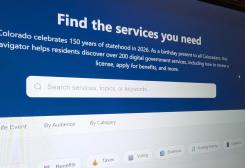Cyber and digital services to remain top issues, NASCIO president says

As his extended term as president of the National Association of State Chief Information Officers winds down, New Hampshire CIO Denis Goulet said this week that he expects cybersecurity, digital services and broader IT modernization to remain at the forefront for his colleagues in the coming years.
Speaking on the association’s podcast, Goulet said that despite the ongoing threat of ransomware against state and local governments, there have been a few bright spots on the cyber agenda, particularly the federal government’s decision to waive registration fees on the .gov top-level domain and movement in Congress on a dedicated grant program.
“Things are looking good,” Goulet said on an episode of NASCIO Voices.
He said that in his state, many towns and counties are taking advantage of the free registrations on .gov, which includes security features like active vulnerability monitoring and two-factor authentication.
He also said that after years of warning by NASCIO and other IT-minded groups, lawmakers finally moved to create a cybersecurity grant fund targeting state and local governments, with $1 billion included in the Senate’s $1.2 trillion infrastructure plan. Goulet said that money came about in part because members of Congress have realized ransomware is a threat that affects organizations in the places they represent.
“When something bangs you on the head, you notice,” he said on the podcast. “We’ve heard it over and over again from members of the House or Senate: ‘I saw that affect my community.’ It needs to be looked at at a national level. I think we’re getting there.”
Goulet was named NASCIO president in February 2020 when his predecessor, former North Carolina CIO Eric Boyette, was tapped to lead that state’s transportation agency — and about three weeks before the COVID-19 pandemic took hold. With the health crisis still raging last October, Goulet was given an additional full year atop NASCIO’s executive committee, though his term is to come to an end at the association’s conference this fall in Seattle.
When asked what issues he expects will dominate CIOs’ duties in the coming years, Goulet named cybersecurity — which has topped NASCIO’s list of priorities for eight years running — as well as digital services and the modernization plans meant to help states deliver those services.
“Digital government services were brought to the forefront during COVID-19,” he said. “There’s some really good news built in there for state IT organizations because people now understand how important that is.”
Goulet added that state CIOs may have opportunities to make permanent the heightened influence they had as a result of the roles their agencies played in states’ pandemic responses.
“If we’re not on our toes all the time looking to build and develop relationships and deliver on our mission, we could lose the ground we gained,” he said.






